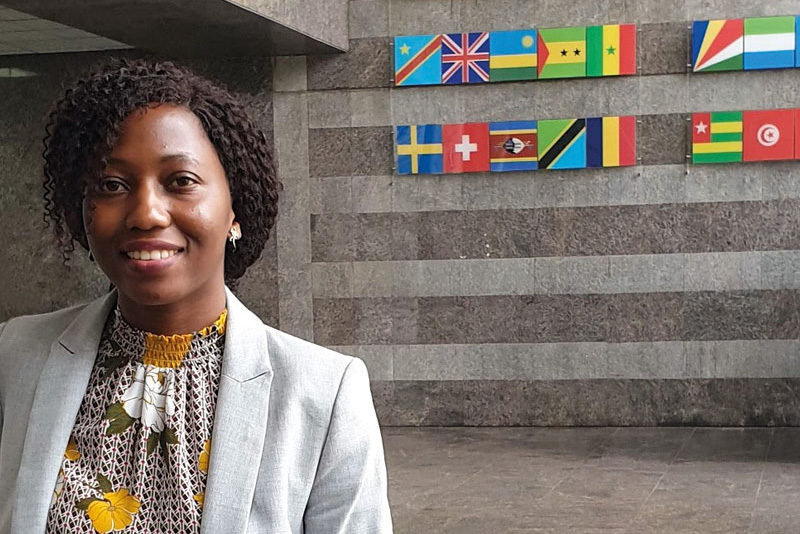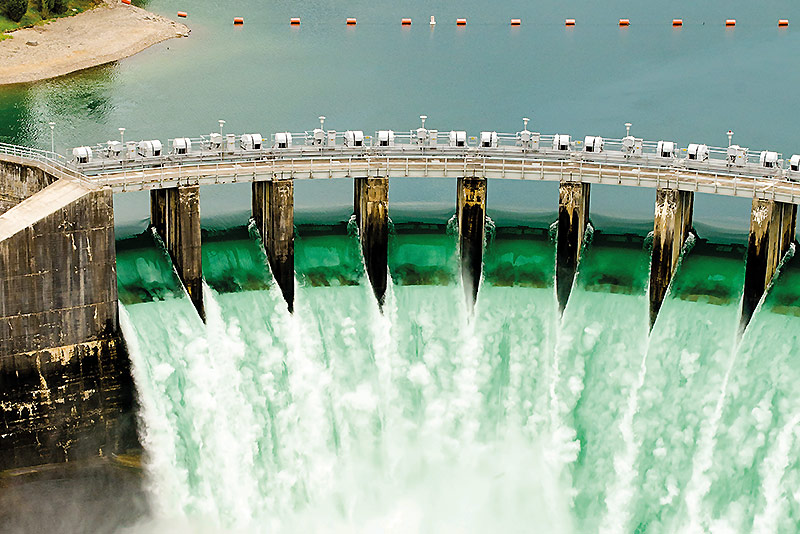Providing sustainable water solutions
Claire Nakabugo, Swarovski Foundation Scholar and MSc Water Science, Policy and Management graduate, is contributing to local, national and international conversations about sustainable water management.
Growing up in Uganda, Claire Nakabugo witnessed first-hand the challenges of water management: in the wet season, the devastation wrought by landslides, damaged infrastructure and flash floods in the cities; in the dry season, the destruction of livelihoods dependent on subsistence agriculture and the resulting famine.
After completing her undergraduate degree in agricultural engineering, she worked for a year helping to reduce the impact of flash floods in the city of Kampala. Claire says: ‘I looked at how to increase drainage efficiency through quantifying sediment accumulation, which limits the ability to transport storm water outside the city. I soon found that I wanted to acquire greater knowledge to manage such challenges.’
 Claire Nakabugo at the headquarters of the African Development Bank
Claire Nakabugo at the headquarters of the African Development Bank
It was at this point that Claire identified the MSc in Water Science, Policy and Management at Oxford as the course to pursue. Daunted at first, Claire says: ‘No-one I knew had ever studied at Oxford. It felt like very high ground to break because there was no example. But I did it.’
Claire needed funding to be able to take up her place on the course and, just as she was losing hope, was offered a full scholarship from the Swarovski Foundation. ‘That news came when I was really downcast, and it was one of the best things that happened to me,’ Claire says. ‘I didn’t have another source of funding from Uganda but, with the course fees and living expenses covered, I didn’t have to worry about taking up another job. It truly gave me the peace of mind to focus on my studies and give it my best.’
She continues: ‘It’s actually the most intense thing I have ever had to do. My experience at Oxford was both cultural and educational. It stretched my knowledge so broadly, starting with my classmates: they were lawyers, social scientists, political scientists, doctors, and some were in the public health field. They were asking questions that I would never think of, given my engineering background. That was so enlightening for me. The whole experience really developed the skills I needed to work in an international environment.’
The master’s degree was key to Claire achieving her next position as an intern at the International Hydropower Association (IHA), a policy-oriented organisation for renewable energy and a consultancy for water management and hydropower development across the world. Claire says: ‘My internship required strong communication skills to write and deliver information in a way that was easily understandable by the public. The course at Oxford was very interactive and these were skills that I developed there.
 A hydro-electric dam
A hydro-electric dam
‘In fact, the scholarship has really transformed my career direction. I’m now looking at roles that are more critical for decision-making or that cut across broader spectrums in international development. During my internship I represented my organisation in a bilateral meeting with the African Development Bank and presented to 20 senior staff. This is something I couldn’t have done before completing the master’s.’
Claire is now devising a project for an area in western Uganda where a river often bursts its banks, looking at it not only from an engineering perspective but also from a social and economic one. She continues to work as a consultant for IHA, contributing to policy adaptation and implementation. This important work includes disseminating good practice for sediment management in hydropower dams and reservoirs, because maintaining river health and sustaining the life cycle of infrastructure is crucial for the continued provision of water storage, flood control and electricity generation.
‘I have expanded my area of influence, knowledge, skill and confidence, to answer more questions and provide solutions to a range of challenging issues on a broader scale’
A multidisciplinary approach is the only way forward. Claire explains: ‘Water is at the intersection of so many sectors – food, health, energy and beyond – that it has a societal impact, a psychological impact, and an impact on health issues and political issues. When it comes to policy intervention, transboundary action and cooperation, there are so many actors that come into play. You cannot manage water exclusively, separate from the society that depends on it.’
Claire is inspired by the mission of the Swarovski Foundation to support culture and creativity, promote human empowerment and preserve the environment, and feels privileged to have the opportunity to contribute to solutions – not only through her work. ‘The principles behind the Swarovski Foundation are deeply motivational,’ she says. ‘It was set up by Nadja Swarovski to honour the philanthropic spirit of Daniel Swarovski, the founder of the Swarovski crystal business. He stressed that to be successful, you must not only think of yourself but also of other people. The Swarovski Foundation has created opportunities for so many through its success. I was given an opportunity, which has inspired me to extend this to others in any way I can.’
SUPPORT STUDENTS AT OXFORD